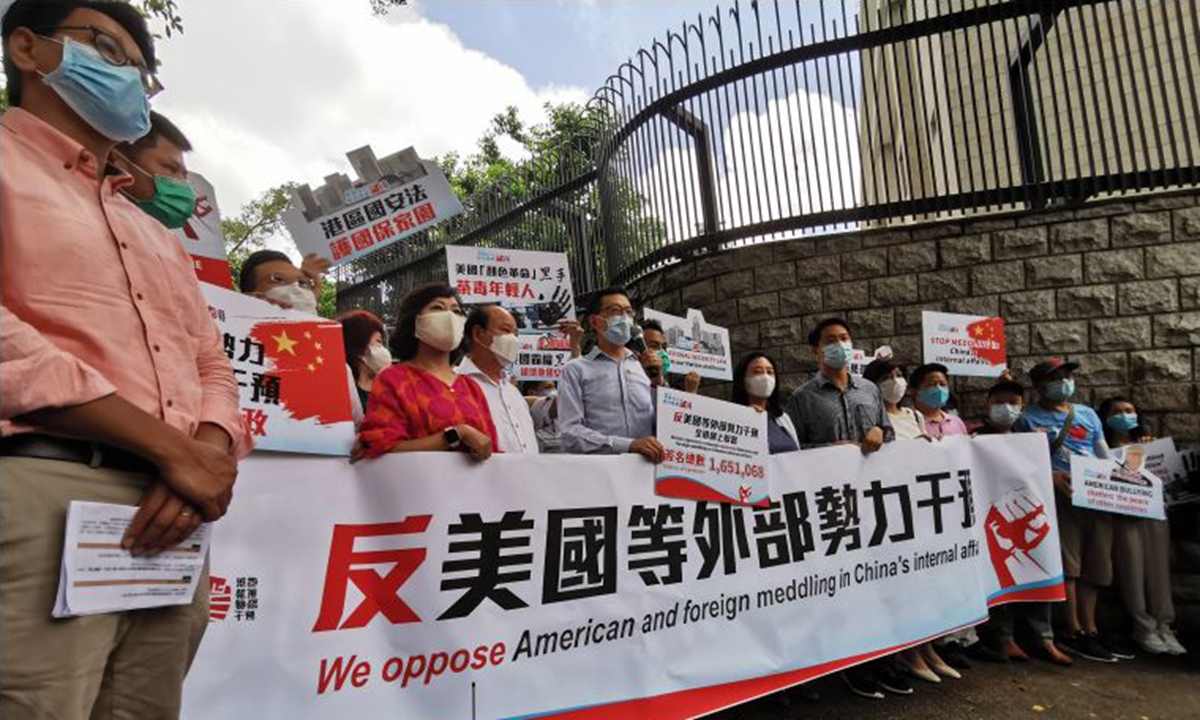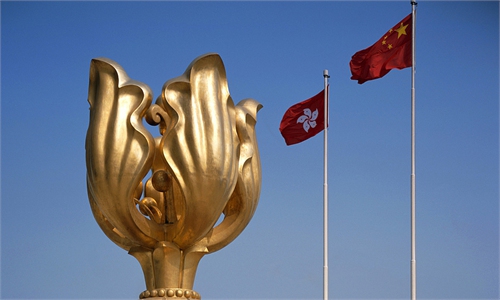US double standards have been caught again on Hong Kong issues: Global Times editorial

Hong Kong residents hold banners opposing the US and foreign meddling in China's internal affairs in front of the US Consulate General in Hong Kong on July 2, 2020.
The legislatures on the two sides of the Pacific have been in action over the past few days. The US House of Representatives on Wednesday passed a large-scale electoral reform bill which covers all aspects of the election process. In addition to clarifying early voting regulations, removing regulations that hinder voters from voting and restricting big sponsors' influence on politics, the bill also requires US states to set up independent committees to re-divide boundaries of electoral districts on the basis of population data.
On Thursday, the Standing Committee of the 13th National People's Congress (NPC) of China announced the agenda for its fourth session. The agenda includes deliberating a draft NPC decision on improving the electoral system of the Hong Kong Special Administrative Region (HKSAR). This means that the electoral system of the HKSAR may be revised, and public opinion generally believes that the revision is to truly realize the principle of "patriots governing Hong Kong."
These are adjustment efforts made by China and the US for their respective national and regional electoral systems. The two countries' national conditions are very different and their adjustments are not on the same level. The two countries' circumstances behind the adjustments are also different. But there is still something in common - the original election method does not fit the current situation anymore, and the purpose of the adjustment is to ensure that the election process is not manipulated by some forces and the process better matches the public's authentic will.
Honestly speaking, the bill passed by the US House of Representatives has caused a lot of controversy in the country. Redefining electoral districts is of great interest to both the Democratic and Republican parties, and has become the biggest focus of the struggle surrounding the bill. The bill received collective resistance from Republicans in the US House of Representatives and passed with only a small advantage. Many do not believe the bill can pass in the Senate.
However, neither Democrats nor Republicans disagree that the US election law needs to be adjusted according to the ongoing changes. As the population flows, some constituencies have been filled with more people, while in other constituencies, the number of residents has declined. The possibility to adjust the number of seats in the House of Representatives always remains. Furthermore, with the change of life scenarios and technology, some parts of the election may become outdated and some fresh requirements would appear. But the two parties are currently struggling on how to make the adjustments.
What is puzzling is that as the US has been fighting over how to amend the election law, it is also accusing China's NPC of adjusting the election methods in the HKSAR. US public opinion organizations have taken the lead to label the adjustment as impacting Hong Kong's democracy. They do not even realize they are practicing obvious double standards. In fact, their double standards have lasted too long and they themselves have become numb.
Hong Kong, as a special administrative region of China, has a cultural and governance style that is closest to that of the West. Many things that have taken place in Hong Kong are comparable to similar things that have happened in the West. However, some US elites have often ignored such comparability and make completely opposite moral evaluations. The most well-known example is House Speaker Nancy Pelosi calling Hong Kong turmoil a "beautiful sight to behold." However, such a "beautiful sight" has led to rioters' storming of the Hong Kong's Legislative Council Complex. But when the US Capitol was occupied by protesters in January, the US political and public opinion circles criticized them. Double standards have already become a model of the US and there is no moral obstacle.
Every country has its own laws. The purpose of modern laws is to maintain order, so that political systems can run smoothly and people's fundamental interests can be defended. Any amendments to the electoral methods are made to address problems that have already been exposed. Only practices can test whether the amendments are positive or not. China is a sovereign country, and Hong Kong is a special administrative region under China's governance. Only the Chinese central government has the right to decide whether the region's election methods can be amended, or how to amend them.
Just as China should not casually judge whether the US House of Representatives should pass the large-scale electoral reform bill, neither should the US make irresponsible remarks on how China should improve Hong Kong's election methods, let alone believe that they have the right to interfere in the process. They need self-respect as well as respect for others. This is our warning. If they continue to engage in the performance of intervention, the embarrassment of failure will be waiting for them at any time.

